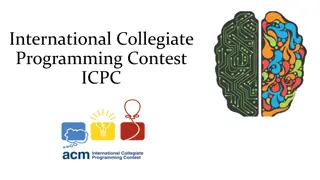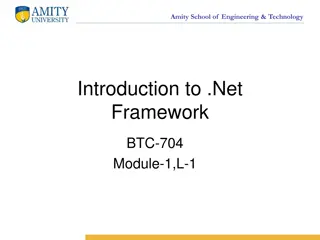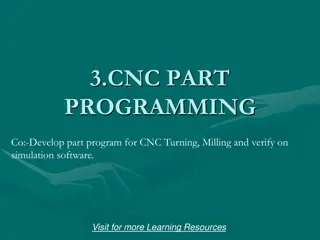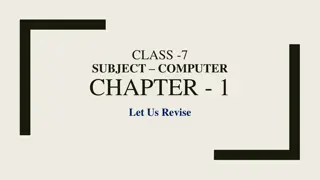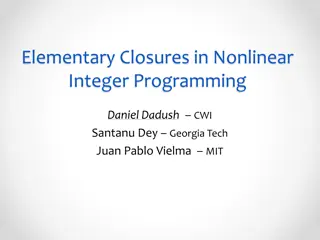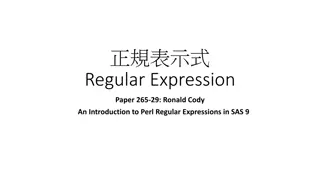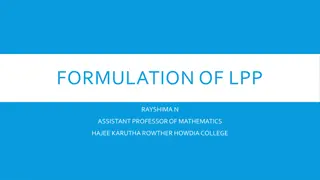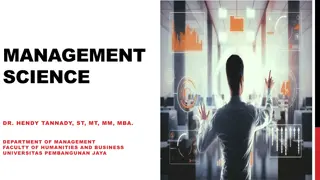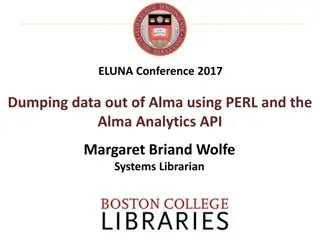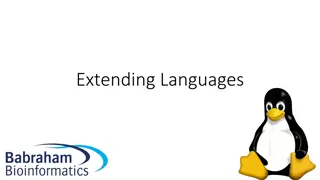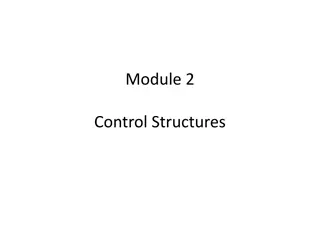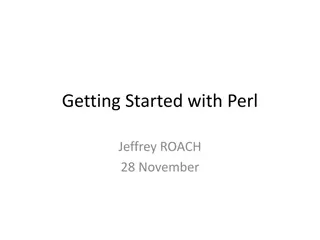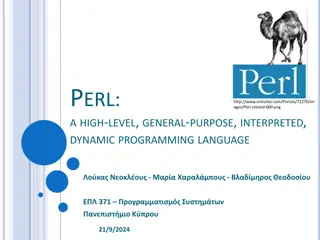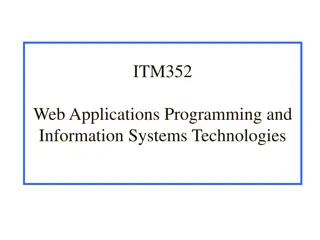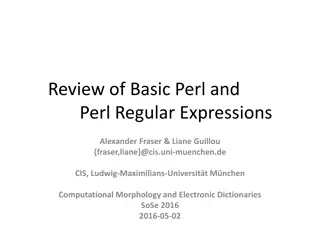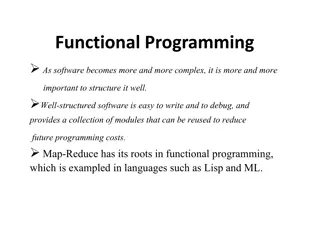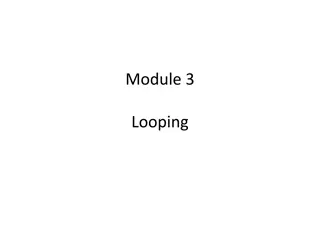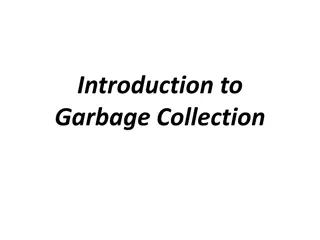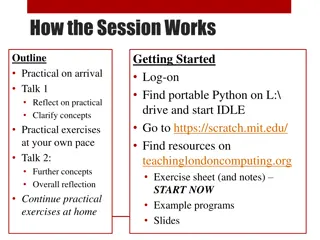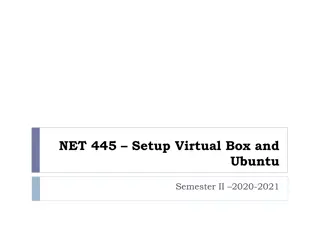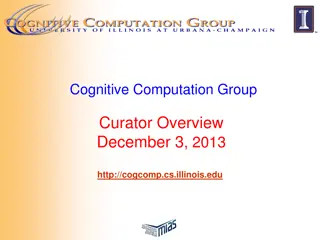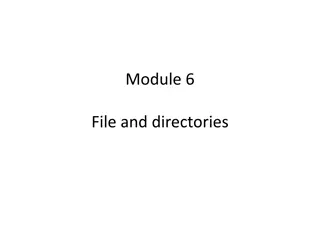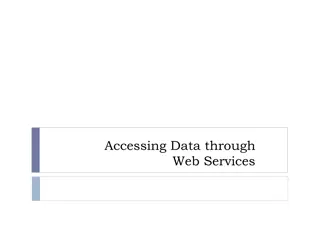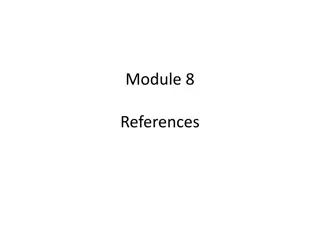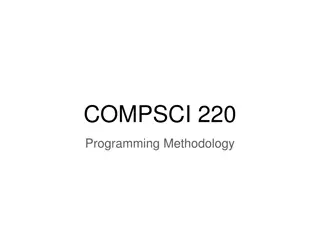Functional Programming
Functional programming, a paradigm that emphasizes declarative programming, pure functions, and limited side effects. Explore the benefits and characteristics of functional programming languages.
0 views • 20 slides
Programming in C: Overview and Constants Explanation
Programming in C is a fundamental introductory guide to the C programming language. It covers the basics of C, including its development history, character set, constants, and rules for constructing constants like integer and real constants. Dr. M. A. JAMAL MOHAMED YASEEN ZUBEIR, an Assistant Profes
4 views • 33 slides
International Collegiate Programming Contest (ICPC) Overview and Rules
The International Collegiate Programming Contest (ICPC) is a prestigious global competition in competitive programming supported by major tech companies like Google and Facebook. Participants tackle logical and mathematical problems by developing efficient algorithms and implementing them in various
5 views • 17 slides
Decision Analysis and Operations Research in Management
This content delves into Management Decision Analysis and Operations Research techniques such as Linear Programming, Integer Linear Programming, Dynamic Programming, Nonlinear Programming, and Network Programming. It covers the phases of an Operations Research study, mathematical modeling for decisi
0 views • 36 slides
Introduction to Amity School of Engineering & Technology
Amity School of Engineering & Technology offers courses in .NET Framework, Windows GUI development, C/C++ programming, Visual Basic, and Java/J2EE programming. The curriculum covers topics such as Win32 API, MFC, object-oriented programming, and web development. Students learn to develop application
1 views • 14 slides
Module 2: PSEA and Safe Programming Training of Trainers (ToT) by CRS HRD
This Module 2 focuses on PSEA and Safe Programming, covering key sessions on understanding safe programming, identifying protection and SEA risks, and mitigating risks. It emphasizes the importance of safe programming in increasing safety, dignity, and access, with staff playing a crucial role. Part
3 views • 19 slides
Comprehensive Guide to CNC Part Programming
Learn about CNC part programming for turning and milling machines. Understand the importance of part programs, program input devices, machine control unit functions, and CNC programming methods like offline and conversational programming. Explore the Cartesian coordinate system, tool positioning, an
0 views • 61 slides
Computer Programming: Basics and Beyond
In this chapter, we delve into the fundamental concepts of computer programming. We explore the definition of a program, the role of programming languages, types of programming languages, and generations of programming languages. Additionally, an assignment is provided to reinforce the key learnings
0 views • 25 slides
Advances in Integer Linear Programming and Closure Techniques
Explore cutting planes, convex integer programming, Chvátal-Gomory cuts, and closure methods in nonlinear integer programming. Discover how these techniques enhance the efficiency and effectiveness of integer programming models, leading to substantial progress and improved solutions.
1 views • 40 slides
Introduction to Perl Regular Expressions in SAS
Regular expressions are powerful tools for working with unstructured data in SAS, allowing you to search for specific patterns, extract substrings, and perform text substitutions using metacharacters in Perl. While writing regular expressions can be challenging at first, with practice, you can becom
1 views • 33 slides
Object-Oriented Programming (OOP) in Python
Python is a versatile programming language that supports various programming approaches. Object-Oriented Programming (OOP) is a popular method in Python where objects are created to solve programming problems. OOP in Python focuses on creating reusable code, following the principle of DRY (Don't Rep
2 views • 35 slides
Formulation of Linear Programming Problems in Decision Making
Linear Programming is a mathematical technique used to optimize resource allocation and achieve specific objectives in decision-making. The nature of Linear Programming problems includes product-mix and blending problems, with components like decision variables and constraints. Various terminologies
1 views • 14 slides
Introduction to Computers and C++ Programming Lecture 1 - Overview and Basics
This lecture covers the fundamental concepts in computer systems and programming using C++. Topics include the main components of a computer, bytes and addresses in memory, computer systems hardware and software, understanding programs, programming languages, compilers, preparing and running C++ pro
2 views • 21 slides
Linear Programming: A Tool for Optimizing Business Operations
Explore the application of linear programming in business, as exemplified by the case study of San Miguel Corporation. Learn how linear programming models can help maximize profits, optimize resource allocation, and streamline decision-making processes in various industries. Discover the fundamental
1 views • 19 slides
Web Application Development and Programming CTE Program Overview
Viera High School offers a comprehensive CTE program in Web Application Development and Programming, taught by Mr. Dohmen. Students learn popular programming languages like Python, SQL, JavaScript, Java, C#, and C. The courses cover web programming, JavaScripting, and PHP programming, providing cert
3 views • 7 slides
Introduction to Programming with RobotC in Robotics Education
Programming in robotics involves giving specific directions to a robot using software like RobotC. This introduction covers the basics of programming, software organization, and how to get started with RobotC through creating flow charts and programming tasks. Learn about setting up RobotC, creating
1 views • 8 slides
Introduction to Programming and Computer Instructions
Programming is the process of creating instructions for computers to follow and accomplish tasks. It involves turning human language instructions into detailed binary machine language. Before learning programming, individuals may have different levels of experience, ranging from no experience to pro
0 views • 16 slides
Dumping Data from Alma Using PERL and the Alma Analytics API
Learn how to extract data from Alma using PERL programming language and the Alma Analytics API. Get insights on API calls, required parameters, optional parameters like setting row limits, and using resumption tokens for handling large data sets efficiently.
0 views • 16 slides
Development of Attosecond Theory for Nobel Prize through Verilog Programming
Attosecond generation is a crucial technique for creating attosecond pulses by manipulating radiation waves. This research paper focuses on developing the Attosecond generation equation through Verilog programming and validating it using test programming techniques. The interface between equations,
2 views • 15 slides
Language Extensions and Package Installations
Explore how to extend popular languages like R, Perl, and Python by installing extensions for new functionalities. Learn about installing R packages from different sources - CRAN, BioConductor, and others. Discover how to install Perl modules using CPAN and structured naming formats.
0 views • 16 slides
CS252 Systems Programming Course Overview
This course overview covers topics such as C programming review, Unix basics, Unix systems programming, and grading details. The course includes labs on C/C++ programming, Unix shell scripting, and writing your own shell. Communication is emphasized through Piazza for questions/answers and Blackboar
0 views • 41 slides
Perl Control Structures and Comparison Operators
In Perl, comparison operators are used for standard comparisons, where Perl supports operators like greater than (>), less than (<), greater than or equal to (>=), less than or equal to (<=), equal to (==), and not equal to (!=). Boolean values like true and false are represented by numerical values
0 views • 25 slides
Overview of Perl Programming: Features, Popularity, and Learning
Perl is a versatile scripting language suitable for various tasks such as test processing, system administration, and bioinformatics. Despite a decline in popularity due to the rise of languages like PHP and Python, Perl remains useful and easily accessible on different platforms. Learning Perl requ
0 views • 24 slides
Introduction to Perl Programming Language
Perl is a high-level, general-purpose, interpreted, dynamic programming language created by Larry Wall. It is known for its practical extraction and reporting capabilities, robust shell scripting, and support for CGI scripts. Perl is celebrated for its modularity, case-sensitivity, and extensive lib
0 views • 27 slides
Introduction to Programming Languages and Functional Programming with OCaml
Welcome to Lecture 1 of CSEP505 on Programming Languages focusing on OCaml and functional programming. Professor Dan Grossman introduces the course, discusses the importance of studying programming languages, and shares insights on course mechanics and content. Topics include staff introductions, co
1 views • 84 slides
ITM352 and Its Role in MIS
Welcome to ITM352, a course focusing on acquiring basic programming skills in a business context. This course emphasizes hands-on experience in developing relevant software applications, addressing real technology problems, and fostering rapid self-learning of IS/IT technologies. Misconceptions arou
0 views • 36 slides
Review of Basic Perl and Perl Regular Expressions
A thorough review of Perl and Perl Regular Expressions covering topics such as the importance of regular expressions in Perl, the benefits and drawbacks of using Perl for scripting, a simple Perl example, understanding Perl syntax, and how to run a Perl program. The review emphasizes Perl's strength
0 views • 60 slides
Functional Programming Paradigm
Functional programming emphasizes well-structured software that is easy to write and debug, with reusable modules to reduce future programming costs. It introduces higher-order functions and first-class function values, fostering declarative programming for tasks like symbolic data manipulation and
0 views • 21 slides
Perl Loops: For and While Loops Explained
In Perl, loops such as for and while are essential for executing a block of code repeatedly based on specified conditions. This article delves into the intricacies of for loops, explaining their components and execution flow, along with a practical example. The concept of while loops is also covered
1 views • 38 slides
Essential Principles of Teaching Programming Languages
Foundational concepts in programming form the core of computing. This encompasses understanding programming fundamentals, teaching language aspects effectively, statistical programming for data analysis, and guiding students unfamiliar with programming environments towards grasping the logic and sim
0 views • 23 slides
Computer Programming Principles
Dive into the world of computer programming, covering high-level and machine languages, compilers, interpreters, writing programs, top-down design, and the array of programming languages available. Understand the essentials of building code to control computers, the diversity of programming language
0 views • 23 slides
Garbage Collection in Programming
Garbage collection automates memory reclamation, freeing programmers from manual memory deallocation tasks. This process enhances program reliability, reduces errors, and decouples memory management from other software engineering concerns. Originating in LISP in 1960, garbage collection has become
0 views • 25 slides
Transitioning from Scratch to Python: A Practical Approach for Learning Textual Programming
Explore the transition from visual programming in Scratch to textual programming in Python using Turtle Graphics. Engage in practical exercises, clarify key concepts, and reflect on the challenges and progress in learning core programming concepts. Utilize resources from TeachingLondon Computing to
0 views • 21 slides
Setting Up VirtualBox and Ubuntu for .NET Course Semester II 2020-2021
Learn how to set up VirtualBox, download and install Ubuntu Mate 18, start the virtual machine, explore the GUI, and install Geany IDE for editing files efficiently. Geany IDE offers syntax highlighting, code completion, and supports various file types like C, Java, PHP, HTML, Python, Perl, and Pasc
0 views • 8 slides
Overview of Cognitive Computation Group Curator Tools
The Cognitive Computation Group Curator provides a range of NLP tools for tasks such as Tokenization, Part-Of-Speech Tagging, Named Entity Recognition, and more. Users can access these tools in various programming languages like Python, Java, and Perl, with a focus on creating efficient NLP pipeline
0 views • 23 slides
File Handling in Perl
File handling in Perl involves using filehandles as references between your program and the operating system's file structure. Learn about naming conventions for filehandles, opening files, checking file open status, using pathnames correctly, and handling potential issues with paths in this informa
0 views • 52 slides
Web Services: A Comprehensive Guide
Explore the world of web services, from accessing data to utilizing IRIS and FDSN services. Learn about programmatic support in various languages like Java, Perl, Python, and more. Discover how to fetch data using scripts and examples, along with performance insights on WS-dataselect.
0 views • 18 slides
CS 288-102 Intensive Programming in Linux Spring 2017 Course Details
Learn Linux programming, C language proficiency, Bash scripting, and more in this intensive course taught by Instructor C.F. Yurkoski. The course covers programming in Linux environment, command line interface, C language, client/server programming, and essential programming concepts like pointers,
0 views • 31 slides
Perl References and Pointers in High-Level Languages
Explore the concept of references in Perl, similar to pointers in languages like C and C++. Learn how references allow you to work with memory addresses and change variable values efficiently. Discover the basics of creating, using, and dereferencing references in Perl programming.
0 views • 24 slides
Functional Programming Concepts for COMPSCI 220 Programming Methodology
In this tutorial, we explore functional programming concepts in the context of COMPSCI 220 Programming Methodology. We delve into writing functions using `reduce` and discuss examples and implementations of various functions like sum, product, and string length calculation. We also analyze the diffe
1 views • 47 slides


